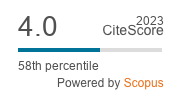Dynamic Evolution Control for Fuel Cell DC-DC Converter
Abstract
Fuel cells are new alternative energy resource that has a great promise for distributed generation and electric vehicle application. However, fuel cells have a slow response due to their slow internal electromechanical and thermodynamic response. To optimize the fuel cell system performance, a fuel cell DC-DC converter with an appropriate controller which can regulate the power flow and automatically adjust the converter output voltage is needed. This paper proposes a new control technique for fuel cell DC-DC power converter. Design of the proposed control method for fuel cell DC-DC power converter is provided. A new approach for converter controllers synthesis based on dynamic evolution control theory is presented. In this paper, synthesis example of boost DC-DC converter is discussed. Performance of the proposed dynamic evolution control under step load variation condition is simulated under Matlab-Simulink environment. Simulation results show that the proposed techniques are capable for controlling fuel cell DC-DC converter.
Full Text:
PDFReferences
. Dwari S, Parsa L. A Novel High Efficiency High Power Interleaved Coupled-Inductor Boost DC-DC Converter for Hybrid and Fuel Cell Electric Vehicle. Vehicle Power and Propulsion Conference. 2007; 1: 399-404.
. Xu H, Wen X, Qiao E, Guo X, Kong L. High Power Interleaved Boost Converter in Fuel Cell Hybrid Electric Vehicle. IEEE International Conference on Electric Machines and Drives. 2005; 1:1814-1819.
. Samosir AS, Yatim AHM. Dynamic evolution control of bidirectional DC-DC converter for interfacing ultracapacitor energy storage to Fuel Cell Electric Vehicle system. Power Engineering Conference. Australia. 2008; 1:1-6.
. Samosir AS, Yatim AHM. Implementation of Dynamic Evolution Control of Bidirectional DC-DC Converter for Interfacing Ultracapacitor Energy Storage to Fuel Cell System. IEEE Transactions on Industrial Electronics. 2010; 57(10): 3468-3473.
. Maggio G, Recupero V, Pino L. Modeling polymer electrolyte fuel cells: an innovative approach. Journal of Power Sources. 2001; 101(2): 275–286.
. Friede W, Rael S, Davat B. Mathematical model and characterization of the transient behaviour of a PEM fuel cell. IEEE Transactions on Power Electronics. 2004; (9): 1234–1241.
. Lee JM, Cho BH. A dynamic Model of a PEM Fuel Cell System. APEC 2009 conference, 2009; 1: 720–724.
. Hamelin J, Agbossou K, Laperrière A, Laurencelle F, Bose TK. Dynamic behavior of a PEM fuel cell stack for stationary applications. International Journal Hydrogen Energy. 2001; 26(6): 625–629.
. Thounthong P, Rael S, Davat B. Control Strategy of Fuel Cell and Supercapacitors Association for a Distributed Generation System. Transactions on Industrial Electronics. 2007; (12): 3225–3233.
. Nehrir M H, Wang C, Shaw S R. Fuel cells: promising devices for distributed generation. IEEE Power Energy Magazine. 2006; 4(1): 47–53
. Samosir A S, Anwari M, Yatim A H M. A simple PEM Fuel Cell Emulator using Electrical Circuit model. International Power and Energy Conference. Singapore. 2010; 1: 881–885.
. Farzad Abdous. Fuel Cell/DC-DC Convertor Control by Sliding Mode Method. Waset Journal. 2009; 49: 1012-1016.
DOI: http://doi.org/10.12928/telkomnika.v9i1.686
Refbacks
- There are currently no refbacks.

This work is licensed under a Creative Commons Attribution-ShareAlike 4.0 International License.
TELKOMNIKA Telecommunication, Computing, Electronics and Control
ISSN: 1693-6930, e-ISSN: 2302-9293
Universitas Ahmad Dahlan, 4th Campus
Jl. Ringroad Selatan, Kragilan, Tamanan, Banguntapan, Bantul, Yogyakarta, Indonesia 55191
Phone: +62 (274) 563515, 511830, 379418, 371120
Fax: +62 274 564604

